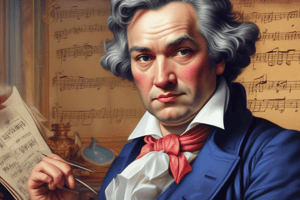Podcast
Questions and Answers
What was one of Beethoven's contributions to the orchestral structure of his compositions?
What was one of Beethoven's contributions to the orchestral structure of his compositions?
- Incorporation of only string instruments
- Use of larger orchestras (correct)
- Favoring smaller orchestras
- Elimination of brass instruments
What characteristic is most notable about the mood of Beethoven's music?
What characteristic is most notable about the mood of Beethoven's music?
- Bright and cheerful
- Dark and somber (correct)
- Mysterious and ambiguous
- Light and playful
Which symphony includes the famous 'Choral' finale?
Which symphony includes the famous 'Choral' finale?
- Symphony No. 9 (correct)
- Symphony No. 5
- Symphony No. 6
- Symphony No. 8
What musical technique did Beethoven extensively develop in his compositions?
What musical technique did Beethoven extensively develop in his compositions?
At what age did Beethoven begin to lose his hearing?
At what age did Beethoven begin to lose his hearing?
What musical technique is characterized by the pattern lowest note - highest note - middle note - highest note?
What musical technique is characterized by the pattern lowest note - highest note - middle note - highest note?
Which of the following genres does NOT belong to vocal forms of the Classical period?
Which of the following genres does NOT belong to vocal forms of the Classical period?
Which composer is known as the 'Father of the Symphony'?
Which composer is known as the 'Father of the Symphony'?
What is the texture generally found in Classical music?
What is the texture generally found in Classical music?
Which work is NOT associated with Wolfgang Amadeus Mozart?
Which work is NOT associated with Wolfgang Amadeus Mozart?
Which characterizes the crescendo in Classical music?
Which characterizes the crescendo in Classical music?
In the Classical period, what role did Joseph Haydn primarily hold?
In the Classical period, what role did Joseph Haydn primarily hold?
What best describes the style of Classical music?
What best describes the style of Classical music?
What period does Classical music refer to?
What period does Classical music refer to?
Which of the following is NOT a new music form that emerged during the Classical period?
Which of the following is NOT a new music form that emerged during the Classical period?
Which famous composer is associated with the Classical period?
Which famous composer is associated with the Classical period?
What was a significant social influence on the arts during the Classical period?
What was a significant social influence on the arts during the Classical period?
What major change in society influenced the characteristics of Classical music?
What major change in society influenced the characteristics of Classical music?
What type of opera became popular during the Classical period?
What type of opera became popular during the Classical period?
Which event is associated with the historical context of the Classical period?
Which event is associated with the historical context of the Classical period?
What role did the courts play in the acceptance of Classical music?
What role did the courts play in the acceptance of Classical music?
Flashcards are hidden until you start studying
Study Notes
Classical Period in Music (1750-1820)
- Classical Music developed during the “Age of Reason” when changes in economics and social structures impacted society.
- Classical music was influenced and patronized by the aristocracy, who were in charge of artistic pursuits.
- Important historical events during this period: French Revolution, Napoleonic Wars, American Declaration of Independence, and the American Revolution.
- While the aristocracy were the primary patrons during this period, radio and television have enabled broader access to classical music in modern times.
- Classical music emphasized formal, elegant, simple, and dignified melodies.
- Instrumentation favored larger orchestras, particularly featuring violas, lower registers of violins and cellos, and brass instruments.
- Classical music embraced dynamic shifts through the use of crescendos (augmented forte and piano), the Alberti Bass (a special type of broken chord accompaniment), and homophonic textures.
Instrumental Music Forms
- New musical forms emerged like the Sonata, Concerto, and Symphony.
Vocal Music Forms
- The Opera Seria and Opera Buffa became popular.
Composers
-
Franz Joseph Haydn (1732-1809):
- Regarded as the “Father of the Symphony.”
- Served as a musical director for the Esterhazy family for 30 years.
- Known for compositions such as “Surprise Symphony”, “The Clock”, “The Military”, chamber piano music, and choral works.
-
Wolfgang Amadeus Mozart (1756-1791):
- Child prodigy who played the violin, harpsichord, and piano.
- Composed sonatas, concertos, symphonies, religious works, operas, and operettas.
- Famous for his operas “The Marriage of Figaro”, "Don Giovanni", and “The Magic Flute”.
- Other significant compositions include “Eine Kleine Nachtmusik", Symphony No. 40 in G Major, and Sonata No. 11 in A Major K311.
-
Ludwig van Beethoven (1770-1827):
- Bridged the late Classical Era and the early Romantic Era.
- Known for composing operas, symphonies, and choral works.
- Famous works include Symphony No. 3 (Eroica), No. 5, No. 6 (Pastoral), No. 9 (Choral), "Missa Solemnis", and opera “Fidelio”.
- His music features:
- Larger orchestras.
- A darker mood created by emphasizing violas, lower registers of violins and cellos.
- Connections between themes through a single motif.
- Extensively developed musical themes and motifs through modulation.
- Increased use of brass instruments and dynamics.
- Beethoven became deaf in 1796.
Studying That Suits You
Use AI to generate personalized quizzes and flashcards to suit your learning preferences.




